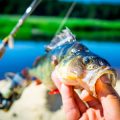Understanding State-Specific Fishing Regulations
If you’re hitting the open road in your RV with a rod and reel, get ready—America’s fishing laws are as varied as its landscapes. Each state manages its own fisheries, which means rules can change fast as you cross state lines. For RV anglers, knowing these differences isn’t just smart; it’ll keep your wallet safe from fines and your trip running smooth. Some states require separate licenses for freshwater and saltwater fishing, while others offer combo permits. Bag limits, size restrictions, and even the types of bait or lures allowed can shift dramatically. In certain states, you’ll find seasonal closures to protect spawning fish, unique catch-and-release zones, or even gear-specific regulations that outlaw barbed hooks or treble hooks in specific waters. What flies in Montana might get you ticketed in Florida. Bottom line: don’t assume what worked at yesterday’s lake will fly at today’s river. Do your homework before you cast—because ignorance won’t get you off the hook if a game warden checks your bucket.
2. Securing the Right Fishing Licenses On the Road
If you’re planning to wet a line while cruising the highways in your RV, getting your fishing licenses squared away is just as important as prepping your tackle box. Every state has its own set of fishing regulations, and you don’t want to get slapped with a fine because you missed a detail. Here’s how to lock down the right licenses before you cast off.
Types of Fishing Licenses
First things first—know what kind of license you need. Most states offer different options depending on where and how you want to fish. Here’s a quick breakdown:
| License Type | Common Use |
|---|---|
| Resident License | For state residents only; usually cheaper |
| Non-Resident License | For out-of-state anglers; often required for RV travelers |
| Short-Term (Day/Week) | Ideal for short stays or passing through |
| Annual License | Best if you’ll be fishing multiple times in one state |
| Specialty Permits | Required for certain species or waters (like trout or saltwater) |
Where to Get Your License
You’ve got options: snag your license online through the state’s official wildlife agency, stop by local tackle shops, outdoor retailers like Bass Pro Shops or Walmart, or sometimes even at gas stations near popular fishing spots. Going digital is often fastest—most states have streamlined apps and websites that’ll get you legal within minutes.
Digital vs. Physical Copies: What Works Best?
The majority of states now accept digital licenses on your phone, which is clutch when you’re bouncing between locations. But it’s smart to keep a printed copy in your tackle bag just in case your phone dies or reception tanks. Check each state’s rules—some still require a hard copy on hand.
Multi-State Travel Tips for RV Anglers
If you’re hitting multiple states, plan ahead. You can’t use an Arizona license in Colorado, so check requirements for every state on your route. Some states offer reciprocal agreements for bordering waters—worth checking out if you’ll fish border lakes or rivers. And always double-check size and bag limits; they change fast and can trip up even veteran anglers.
![]()
3. Federal vs. State Waters: What You Need to Know
If you’re road-tripping in your RV and planning to fish, understanding the difference between federal and state waters is crucial—especially at those bucket-list stops like Lake Tahoe, the Great Lakes, or any national park with a fishing hole. Let’s break it down hard and clear: state waters generally extend from shore out to three miles (for ocean fishing), or cover all inland lakes, rivers, and streams. Each state sets its own rules here—think bag limits, species regulations, special seasons, and licensing requirements.
Federal waters, on the other hand, usually start three miles off the coast and stretch out to 200 miles offshore (the so-called Exclusive Economic Zone). Federal agencies like NOAA manage these zones, setting their own set of rules—often stricter than state laws—to protect marine resources. But here’s the kicker: in places like border rivers (Mississippi River between Iowa and Illinois, for example) or around national parks like Yellowstone or Everglades, the lines can get blurry. Some bodies of water require both a state license and a special federal or park permit, depending on exactly where you cast your line.
If you’re rolling up to a spot that straddles two states—or a national recreation area—always check if reciprocal agreements exist. For instance, some states honor each other’s licenses on shared waters (think Lake Texoma between Texas and Oklahoma), but others don’t play ball. And when it comes to national parks or federal refuges? Expect extra permits or restrictions; sometimes barbless hooks only, catch-and-release mandates, or seasonal closures for spawning protection.
Bottom line: Don’t assume your home-state license covers you everywhere your RV rolls. Do your homework before you hit the water. Scour official websites, call ahead to ranger stations, or check in with local tackle shops—they’ll know the score and help you avoid costly fines or gear confiscation. Remember: ignorance isn’t an excuse if a warden checks your bucket.
4. Catch Limits and Protected Species
Out on the road with your RV, every state line you cross can mean a new set of fishing rules—especially when it comes to daily catch limits and protected species. Here’s what you need to know to keep your fishing adventures legal and hassle-free while traveling across the U.S.
Understanding Catch Limits
Catch limits are not just suggestions—they’re hard numbers that tell you exactly how many fish of each species you can keep in a day. These regulations are enforced to ensure healthy fish populations for future generations, and they vary widely from state to state, or even by specific water bodies within a state. If you get caught with more than the limit, expect hefty fines or worse. Before you cast out, check the current regulations for the exact spot where you plan to fish. Many states offer handy charts or online tools for quick reference.
| State | Bass Limit (per day) | Trout Limit (per day) |
|---|---|---|
| California | 5 | 5 |
| Texas | 5 | 5 |
| Florida | 5 | 6 |
| Minnesota | 6 | 5 |
Protected Species: Know Before You Go
Certain fish are off-limits no matter where you travel. These protected species are often threatened or endangered, making it illegal to target, keep, or even possess them. Lists of protected species change as populations recover or decline, so don’t assume yesterday’s rules apply today. Some regions also have “slot limits” that protect certain size ranges within a species—catching and releasing is mandatory if your fish falls inside that range.
How to Stay Compliant on the Move
- Check before every trip: Use official state wildlife apps or websites for up-to-date info.
- Carry a printed cheat sheet: Make your own quick-reference guide for each region or water body.
- Respect closed seasons: Some areas ban fishing for certain species during spawning periods.
- If in doubt, release it: Not sure if it’s legal? Snap a photo and let it go—better safe than sorry.
The Bottom Line
Catching dinner is great, but keeping it legal is non-negotiable. Take a minute to study local catch limits and protected species before every stop on your RV journey. With a little prep, you’ll avoid tickets—and help keep America’s fisheries thriving for the next generation of anglers.
5. Respecting Local Culture and Private Lands
When youre on the road in your RV, chasing that next big catch, it’s easy to get tunnel vision. But fishing isn’t just about finding water and casting a line—especially in the U.S., where land ownership and local customs run deep. One of the first things you’ll notice is that not all waters are public. Tribal lands, private lakes, and even certain sections of rivers can have unique rules or may be off-limits altogether.
Tribal Lands: Know Before You Go
Fishing on Native American tribal lands is a privilege, not a right. These areas often require special permits that are separate from state-issued licenses. Always check with the local tribal office or website before setting up shop on their territory. In some regions, you might need a tribal guide or even face total restrictions for non-tribal anglers. Show respect by following their protocols—this isn’t just about legality; it’s about honoring traditions that go back generations.
Private Lakes: Ask Permission
Many lakes across the country are privately owned, especially in rural or agricultural areas. Don’t assume access just because there’s no fence or “No Trespassing” sign. If in doubt, track down the owner (sometimes the local bait shop knows), and always ask for permission. Some private lakes operate as pay-to-fish ponds; others might flat-out deny access to outsiders. Either way, trespassing can land you in legal hot water and damage relationships between RVers and locals.
Local Customs: When in Rome…
Every region has its own unwritten rules—whether it’s parking etiquette at popular fishing pull-offs or how early you can fire up your generator without ruffling feathers. Pay attention to how locals behave and don’t be afraid to ask questions at tackle shops or visitor centers. Small gestures—like packing out trash or yielding prime spots to folks who live nearby—go a long way toward building goodwill and keeping doors open for future travelers.
Bottom line: Respect isn’t just about following laws; it’s about blending into the rhythm of each place you visit. With a little homework and some old-fashioned courtesy, you’ll avoid unintentional violations—and maybe even make a few friends along the way.
6. Tech Tools and Resources for Up-to-Date Info
If you want to stay ahead of the curve on fishing laws while rolling down America’s highways, your best bet is to go digital. With ever-changing state regulations and local rules, having the right tech tools makes it easy to avoid fines and fish with confidence wherever your RV takes you. Here are some must-have resources to keep in your virtual tackle box.
Reliable Official Sources
First up, always check official state wildlife or natural resources department websites. They usually have dedicated sections for anglers—complete with downloadable regulation booklets, interactive maps, and license purchasing portals. The U.S. Fish & Wildlife Service (fws.gov) also offers a national directory to help you find state agencies fast.
Mobile Apps for Anglers On-the-Go
For real-time info right at your fingertips, try out apps like Fishbrain, iAngler, or Fish Rules. These apps are loaded with features: GPS mapping of legal fishing areas, instant updates on closed seasons or bag limits, and even digital license storage so you never lose your paperwork in a rainstorm. Most let you filter by state or specific body of water—perfect for crossing borders in an RV.
Fishbrain
This social app connects anglers nationwide and is packed with crowd-sourced fishing intel. It also highlights rules per location so you always know what’s legal.
Fish Rules
A favorite among saltwater anglers, Fish Rules instantly updates local size limits, seasons, and gear restrictions based on your GPS position—no guesswork required.
Quick-Reference Websites
If you prefer desktop research before hitting the road, bookmark sites like TakeMeFishing.org. This site offers an interactive map tool that breaks down licensing requirements and regional regulations across all 50 states. Another solid pick is Recreation.gov, which covers not only federal lands but also lists state-by-state fishing info and permit links.
Pro Tip:
Set up alerts or subscribe to newsletters from your favorite fishing states’ wildlife agencies before your trip. That way, if any emergency rule changes pop up (think: drought closures or new invasive species regs), you’ll be the first to know—even when youre off the grid.
Bottom line: Use the power of tech to stay sharp on fishing laws as you roam the country by RV. With these digital tools on deck, you can focus more on landing trophy catches—and less on dodging tickets.

